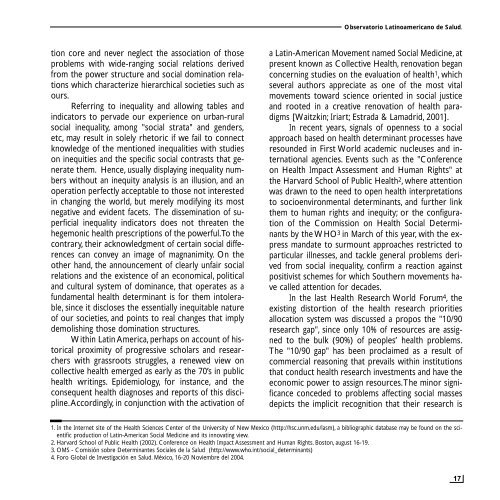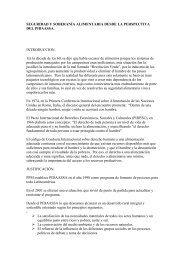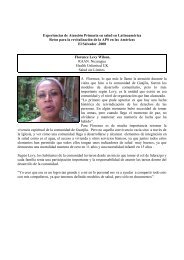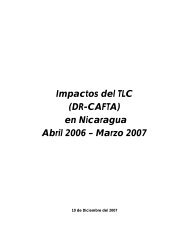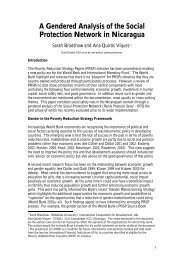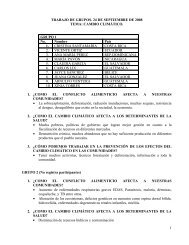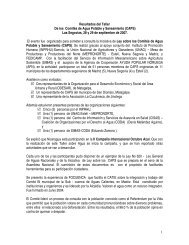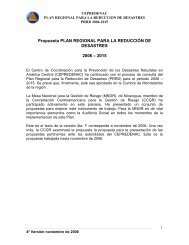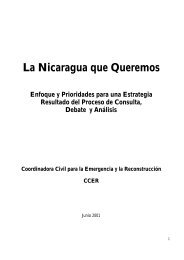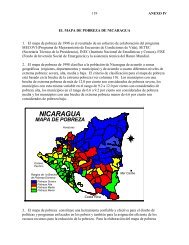Download - CISAS | Centro de Información y Servicios de AsesorÃa ...
Download - CISAS | Centro de Información y Servicios de AsesorÃa ...
Download - CISAS | Centro de Información y Servicios de AsesorÃa ...
Create successful ePaper yourself
Turn your PDF publications into a flip-book with our unique Google optimized e-Paper software.
Observatorio Latinoamericano <strong>de</strong> Salud.tion core and never neglect the association of thoseproblems with wi<strong>de</strong>-ranging social relations <strong>de</strong>rivedfrom the power structure and social domination relationswhich characterize hierarchical societies such asours.Referring to inequality and allowing tables andindicators to perva<strong>de</strong> our experience on urban-ruralsocial inequality, among "social strata" and gen<strong>de</strong>rs,etc, may result in solely rhetoric if we fail to connectknowledge of the mentioned inequalities with studieson inequities and the specific social contrasts that generatethem. Hence, usually displaying inequality numberswithout an inequity analysis is an illusion, and anoperation perfectly acceptable to those not interestedin changing the world, but merely modifying its mostnegative and evi<strong>de</strong>nt facets. The dissemination of superficialinequality indicators does not threaten thehegemonic health prescriptions of the powerful.To thecontrary, their acknowledgment of certain social differencescan convey an image of magnanimity. On theother hand, the announcement of clearly unfair socialrelations and the existence of an economical, politicaland cultural system of dominance, that operates as afundamental health <strong>de</strong>terminant is for them intolerable,since it discloses the essentially inequitable natureof our societies, and points to real changes that imply<strong>de</strong>molishing those domination structures.Within Latin America, perhaps on account of historicalproximity of progressive scholars and researcherswith grassroots struggles, a renewed view oncollective health emerged as early as the 70’s in publichealth writings. Epi<strong>de</strong>miology, for instance, and theconsequent health diagnoses and reports of this discipline.Accordingly,in conjunction with the activation ofa Latin-American Movement named Social Medicine, atpresent known as Collective Health, renovation beganconcerning studies on the evaluation of health 1 ,whichseveral authors appreciate as one of the most vitalmovements toward science oriented in social justiceand rooted in a creative renovation of health paradigms[Waitzkin; Iriart; Estrada & Lamadrid, 2001].In recent years, signals of openness to a socialapproach based on health <strong>de</strong>terminant processes haveresoun<strong>de</strong>d in First World aca<strong>de</strong>mic nucleuses and internationalagencies. Events such as the "Conferenceon Health Impact Assessment and Human Rights" atthe Harvard School of Public Health 2 , where attentionwas drawn to the need to open health interpretationsto socioenvironmental <strong>de</strong>terminants, and further linkthem to human rights and inequity; or the configurationof the Commission on Health Social Determinantsby the WHO 3 in March of this year, with the expressmandate to surmount approaches restricted toparticular illnesses, and tackle general problems <strong>de</strong>rivedfrom social inequality, confirm a reaction againstpositivist schemes for which Southern movements havecalled attention for <strong>de</strong>ca<strong>de</strong>s.In the last Health Research World Forum 4 ,theexisting distortion of the health research prioritiesallocation system was discussed a propos the "10/90research gap", since only 10% of resources are assignedto the bulk (90%) of peoples’ health problems.The "10/90 gap" has been proclaimed as a result ofcommercial reasoning that prevails within institutionsthat conduct health research investments and have theeconomic power to assign resources.The minor significanceconce<strong>de</strong>d to problems affecting social masses<strong>de</strong>picts the implicit recognition that their research is1. In the Internet site of the Health Sciences Center of the University of New Mexico (http://hsc.unm.edu/lasm), a bibliographic database may be found on the scientificproduction of Latin-American Social Medicine and its innovating view.2. Harvard School of Public Health (2002). Conference on Health Impact Assessment and Human Rights. Boston, august 16-19.3. OMS - Comisión sobre Determinantes Sociales <strong>de</strong> la Salud (http://www.who.int/social_<strong>de</strong>terminants)4. Foro Global <strong>de</strong> Investigación en Salud. México, 16-20 Noviembre <strong>de</strong>l 2004.17


